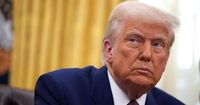Canadian MP Charlie Angus has issued a stark warning to his fellow citizens, advising them to "avoid travel to the United States if at all possible" amid rising concerns about aggressive treatment of Canadians and others entering the U.S. This morning, Angus described the U.S. as an "unprecedented threat," particularly since Donald Trump took office.
In his powerful statement, Angus articulated fears that Canada is witnessing a dramatic erosion of its democratic values due to actions taken by U.S. immigration authorities. "We have seen too many stories of citizens being pulled out of airport lines and being fingerprinted and deported, as if they were criminals," Angus lamented. He believes these actions reflect a shift towards tyranny, stating, "This is the creep of totalitarianism, that is the creep of fascism, and we need to call that out." He emphasized that such actions seem inconsistent with the principles of a democratic country.
Angus's call to action is not isolated. New Zealand has also warned its citizens to "exercise increased caution" when traveling to the U.S., with similar alerts issued by the U.K. and Germany. He criticized Trump's administration for its aggressive stance on immigration, asserting, "Canada will never kiss that gangster's ring. We are north, we are strong, we are free, we will not bend, and we will not give an inch.”
This warning comes just days after the distressing case of Canadian actress Jasmine Mooney, who was detained by ICE for a harrowing 12 days after attempting to enter the U.S. from Mexico. "Everything felt like it was meant to break you," she recalled, shedding light on the anxiety faced by many who cross the border.
Angus pointed out that these aggressive immigration policies impact not just Canadians, but also citizens from other nations. He mentioned various incidents involving European travelers. These include a French scientist who was detained for carrying texts critical of the Trump administration, and several Germans who found themselves ensnared in visa mix-ups. These instances highlight a troubling trend where ordinary travelers become victims of a system that seems increasingly unfriendly.
Adding to his concerns, Angus stated, "Over the last three months our nation has faced an unprecedented threat from our nearest neighbor... a threat to our borders, a threat to our sovereignty, a threat to our very right to exist as an independent democratic nation." He voiced worries about the aggressive targeting of Canadian citizens who cross the border to work or visit, referring to them as collateral damage in a much larger diplomatic tussle.
Many Canadians feel that their rights are being compromised. The stories of people being subjected to arbitrary detention and intense scrutiny at the border have raised alarm bells across Canada. Angus urged the Canadian government to step up and protect its citizens who face undue harassment while traveling.
Reportedly, Trump has even joked about making Canada the 51st state, a notion that only exacerbates tensions and fuels resentment among Canadians who pride themselves on their independence. "What concerns me is the targeting of Canadian citizens," Angus insisted, detailing the stories of countless travelers turned away or detained for flimsy reasons.
The ramifications of these warnings extend far beyond travel advisories. They underscore a deteriorating friendship between the U.S. and Canada, relations that have historically blossomed into a strong partnership. In an age of globalization, where international travel is woven into the fabric of many lives, the actions of one nation can send ripples through its neighbors.
As the situation unfolds, Angus encourages Canadians to stay vigilant, underscoring the seriousness of the threat posed by current U.S. immigration policies. He is not alone in his beliefs; his sentiments are resonating widely among fellow parliamentarians and citizens alike, who share his anxieties about travel to the states.
In a world where movements across borders used to be celebrated, and the exchange of ideas welcomed, the current climate around U.S. immigration policy paints a different picture—one where fear and uncertainty drive a wedge between individuals and their dreams of travel. It raises questions about the freedoms that many once took for granted.
The concern regarding treatment at the border and the implications of such hostile governmental actions on tourism and individual liberties cannot be ignored. As more stories emerge about the challenges faced by travelers, the importance of addressing these issues grows. Angus’s message is clear: without action, this unprecedented threat may only escalate further.




